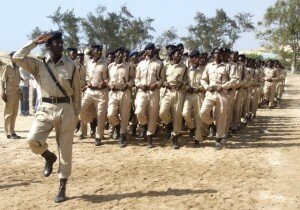Kenya: Govt Trains Somali Youth

Bartamaha (Nairobi):-THE Kenya Government is secretly giving military training to 2,500 Somali youth, the United Nations Monitoring Group on Somalia has concluded.
Kenya has not officially informed the UN Security Council of the training programme and “in a reply dated 23 February 2010 to a Monitoring Group query on this subject, the Government of Kenya denied that it is providing training for Somali troops,” says the UN report.
The report recommends that the UN Security Committee should send a warning letter to Kenya reminding it that is in breach of UN resolutions for “substantive or technical violations of the arms embargo”.
The report warns that the “international dimensions of the Somali conflict are expanding at an accelerated pace. All of Somalia’s neighbours -Djibouti, Ethiopia and Kenya – are militarily involved in the conflict or plan to become involved in the coming months”.
The report was signed by the UN Monitoring Group chairman Claude Heller and tabled before the UN Security Council on March 10.
“Kenya government officials have publicly acknowledged that it had accepted a request from the Somali Transitional Government to train government police officers but denied any other type of training,” states the report.
“Monitoring Group field investigations have confirmed the existence of a military training programme,” the report states.
“The training programme was initiated early in 2009 at the request of President Sharif and under the auspices of his then Minister of Defence Mohamed Abdi Mohammed ‘Gandhi’.” “Kenya hosted the programme, and Ethiopia has been closely been involved. Approximately 2,500 youths were recruited by clan elders and commissioned agents both from within Somalia (exclusively the Juba valley) and North-eastern Kenya, including the Daadab refugee camps,” states the report.
Dadaab refugee camp is home to nearly 400,000 Somali refugees.
“Two training centres were established, one at the Kenya Wildlife Service training camp at Manyani, the other near Archer’s Post in Isiolo. A total of 36 Somali officers were recruited to assist in the training under the command of General Abdi Mahdi and Abdullahi Sheikh Ismail ‘Fartaag’. The officers completed a one month training in September 2009,” says the UN report.
It adds that most of those recruited were from the Ogaden clan with the Marehan in second place.
“In December 2009, the Kenyan Minister for security, George Saitoti, reportedly confirmed to foreign diplomats the existence of Jubaland policy which is intended to establish a ‘buffer zone’ bordering Kenya in the Juba Valley,” the report states.
The decision by the Kenya government to recruit mainly from the Ogaden resulted in complaints from other clans.
In Kenya, the Ogaden clan have served the government in key positions since independence.
The Ogaden clan primarily lives in the central Ogaden plateau of Ethiopia, the North Eastern Province of Kenya, and the Jubaland region of Southern Somalia. They also inhabit Somalia’s major cities such as Mogadishu and Kismayo.
The Marehan mostly live in Jubaland Gedo and Lower Juba Regions in southwest Somalia, in central Somalia, the Ogaden, and in northeast Kenya. They are considered the most fierce nationalists among the Somali people and have always played key roles in both the Somali uprisings.
The media and NGOs have reported irregularities in the training programme, including recruitment of underage youth, false promises of financial remuneration and recruitment of refugees.
“Independent Monitoring Group investigations, including interviews with trainers and trainees from Manyani, have confirmed all this practices did indeed take place, but the group cannot assess the scale of irregularities,” states the UN report.
The report complains that “cooperation with Somalia’s neighbours was especially disappointing… The governments of Kenya and Ethiopia failed to respond to Monitoring Group requests for information”.
However the report exonerated Kenyan CID that alone “provided valuable assistance”.
According to the UN report, the Somali government owes its survival to the small Amisom force of Ugandan and Burundi soldiers. The troops being trained by Kenya were intended to bolster the government army.
“Despite infusions of foreign training and assistance, government security forces remain ineffective, disorganised and corrupt- a composite of independent militias loyal to senior government officials and military officers, who profit from the business of war and resist their integration under a single command,” states the UN report.
———-
Source:- Allafrica
Comments
comments
 Calendar
Calendar




































